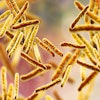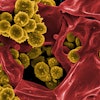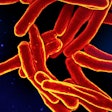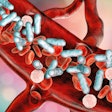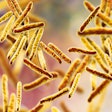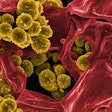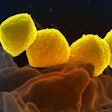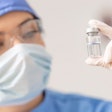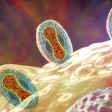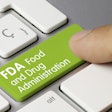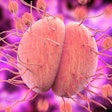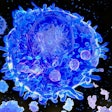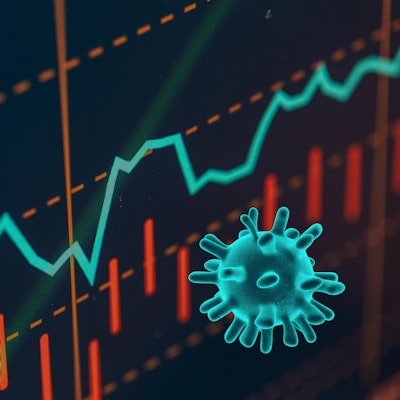
With over a million deaths worldwide, the COVID-19 crisis has continued to unfold with great challenges for the healthcare system and its suppliers. For most aspects of the diagnostic testing process, there still remains a learning curve for all involved.
Even in the fall of 2020, there are capacity limitations, questions about testing accuracy, and challenges with sample collection. But creative solutions have been emerging at labs to help ease the load during a difficult time.
 Bruce Carlson from Kalorama Information.
Bruce Carlson from Kalorama Information.In its COVID-19 update report, Kalorama Information said that test volume was up in labs and among IVD vendors, and new technologies are becoming available. The firm, a sister company to LabPulse.com, projects a $10.5 billion market for COVID-19-related tests. This is an increase of over $1 billion dollars from the firm's August update with much of the increase based on the production and usage of antigen tests.
Antigen tests, most of which are performed rapidly at the point of care, detect viral particles rather than antibodies in the patient. They can offer some major benefits in the effort to control the SARS-CoV-2 pandemic.
The decision to apply antigen tests in certain situations as opposed to others is complicated and is still being completely sorted out. Variables can include:
- Sensitivity and specificity of the test
- Prevalence/outbreak of COVID-19 in the given population
- Remote location, availability of laboratories/hospitals
- Turnaround time of the test
- Cost of the test
- Ability to perform serial testing
The scarcity of various diagnostic test-related products during the COVID-19 pandemic has further driven home the reality that different testing methods are best allocated for different situations. While antigen tests have been criticized for lower performance characteristics compared to antibody and molecular tests, these metrics are not always the most significant.
Antigen tests often can have a sensitivity lower than 85% while the specificity needs to be in the range of 98% or higher. Although a sensitivity of roughly 80% seems striking as a low number, in fact the negative predictive value can still be sufficient if the disease prevalence is appropriately matched.
Becton Dickinson (BD) and Quidel, as well as Roche and Abbott, are significant players in antigen testing; there are scores of others. On July 6, BD announced that the U.S. Food and Drug Administration (FDA) granted emergency use authorization (EUA) for a rapid, point-of-care SARS-CoV-2 diagnostic test for use with its broadly available BD Veritor Plus System.
This new assay delivers results in 15 minutes on the portable instrument, BD Veritor system, which is slightly larger than a cell phone. The instrument is currently in use at more than 25,000 hospitals, clinician offices, urgent care centers, and retail pharmacies in all 50 U.S. states, per the company.
Earlier in the year, Quidel earned an EUA for its Sofia SARS Antigen Fluorescent Immunoassay (FIA). The Sofia FIA uses advanced immunofluorescence-based lateral flow technology in a sandwich design for qualitative detection of nucleocapsid protein from SARS-CoV-2.
Now, the company has received an FDA EUA for a rapid diagnostic that can simultaneously identify influenza A, influenza B, and the novel coronavirus. The ABC Test, also known as the Sofia 2 Flu + SARS Antigen FIA, is a cartridge-based point-of-care diagnostic that works with both nasopharyngeal and nasal swab specimens. The test is designed for use in individuals with suspected respiratory viral infection within five days of symptom onset, according to the company. The three-way test works with the Sofia 2 Fluorescent Immunoassay Analyzer and provides results within 15 minutes.
In August, Abbott launched its sixth COVID-19 test, the BinaxNow COVID-19 Ag Card rapid antigen test -- a fast, reliable, affordable, and portable rapid test that Abbott will produce at mass scale to greatly expand access to testing for people who need it. The company said it would ship millions in September, ramping production to 50 million tests a month in October. This test offers results in 15 minutes and is available as an aid to diagnose the virus that causes COVID-19.
The BinaxNow test can be displayed on an optional app for iPhone and Android devices called Navica. This first-of-its-kind app will allow people who test negative to have a temporary encrypted digital health pass that displays their results.
Roche Diagnostics has a rapid antigen test and recently announced that it intends to launch a high-volume SARS-CoV-2 antigen test as an aid in the diagnosis of SARS-CoV-2 infection. The test is planned to be made available at the end of 2020 for markets accepting the CE Mark.
Roche also intends to file for emergency use authorization from the FDA. The Elecsys SARS-CoV-2 Antigen test is a highly accurate laboratory immunoassay for the in vitro qualitative detection of the nucleocapsid antigen of SARS-CoV-2. The test is performed by healthcare professionals and uses nasopharyngeal or oropharyngeal swab samples from patients with signs and symptoms suggestive of COVID-19, or people with either known or suspected exposure to SARS-CoV-2.
On November 5, Ortho Clinical Diagnostics announced that the FDA accepted the company's emergency use notification for the new Vitros SARS-CoV-2 Antigen test, designed to detect active SARS-CoV-2 infection. The company has also submitted an EUA.
The company said that with high sensitivity and specificity, its SARS-CoV-2 antigen test offers exceptional utility for mass-scale testing where appropriate. The company is promoting its ability to detect infectious patients based on viral load. Per OrthoClinical Diagnostics, studies showed that samples with polymerase chain reaction (PCR) cycle threshold (CT -- a measure of viral load) levels at 30-33 or greater carry little to no live virus, suggesting these patients may no longer be infectious. Compared to PCR, the company says Ortho's test may be better able to identify individuals with COVID-19 who are infectious because the test is offered with 100 percent sensitivity for samples with a CT count of less than 34.
Kalorama's report indicates that the jury is still out on how much antigen tests like those by Quidel or Ortho are replacing or will replace molecular detection methods. They have different purposes for the most part. Right now, the most likely path is that both methods would see usage into 2021, until the disease recedes, or significant and widely distributed pharmaceutical solutions become available.
Read more in-depth analysis in Kalorama's new report.
Bruce Carlson is the publisher of Kalorama Information, part of Science and Medicine Group.
Disclosure: LabPulse.com is a sister company of Kalorama Information.


